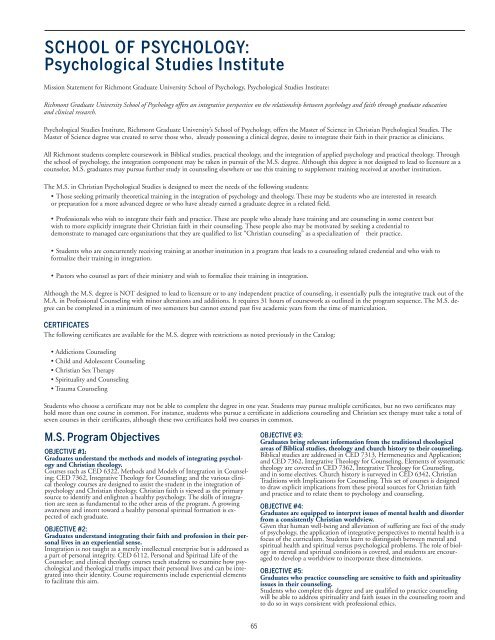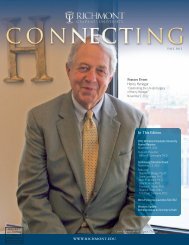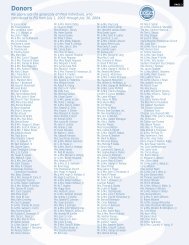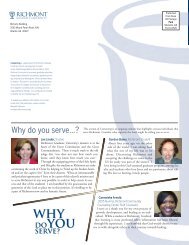Graduate Catalog 2010-2012 - Richmont Graduate University
Graduate Catalog 2010-2012 - Richmont Graduate University
Graduate Catalog 2010-2012 - Richmont Graduate University
Create successful ePaper yourself
Turn your PDF publications into a flip-book with our unique Google optimized e-Paper software.
SCHOOL OF PSYCHOLOGY:<br />
Psychological Studies Institute<br />
Mission Statement for <strong>Richmont</strong> <strong>Graduate</strong> <strong>University</strong> School of Psychology, Psychological Studies Institute:<br />
<strong>Richmont</strong> <strong>Graduate</strong> <strong>University</strong> School of Psychology offers an integrative perspective on the relationship between psychology and faith through graduate education<br />
and clinical research.<br />
Psychological Studies Institute, <strong>Richmont</strong> <strong>Graduate</strong> <strong>University</strong>’s School of Psychology, offers the Master of Science in Christian Psychological Studies. The<br />
Master of Science degree was created to serve those who, already possessing a clinical degree, desire to integrate their faith in their practice as clinicians.<br />
All <strong>Richmont</strong> students complete coursework in Biblical studies, practical theology, and the integration of applied psychology and practical theology. Through<br />
the school of psychology, the integration component may be taken in pursuit of the M.S. degree. Although this degree is not designed to lead to licensure as a<br />
counselor, M.S. graduates may pursue further study in counseling elsewhere or use this training to supplement training received at another institution.<br />
The M.S. in Christian Psychological Studies is designed to meet the needs of the following students:<br />
• Those seeking primarily theoretical training in the integration of psychology and theology. These may be students who are interested in research<br />
or preparation for a more advanced degree or who have already earned a graduate degree in a related field.<br />
• Professionals who wish to integrate their faith and practice. These are people who already have training and are counseling in some context but<br />
wish to more explicitly integrate their Christian faith in their counseling. These people also may be motivated by seeking a credential to<br />
demonstrate to managed care organizations that they are qualified to list “Christian counseling” as a specialization of their practice.<br />
• Students who are concurrently receiving training at another institution in a program that leads to a counseling related credential and who wish to<br />
formalize their training in integration.<br />
• Pastors who counsel as part of their ministry and wish to formalize their training in integration.<br />
Although the M.S. degree is NOT designed to lead to licensure or to any independent practice of counseling, it essentially pulls the integrative track out of the<br />
M.A. in Professional Counseling with minor alterations and additions. It requires 31 hours of coursework as outlined in the program sequence. The M.S. degree<br />
can be completed in a minimum of two semesters but cannot extend past five academic years from the time of matriculation.<br />
CERTIFICATES<br />
The following certificates are available for the M.S. degree with restrictions as noted previously in the <strong>Catalog</strong>:<br />
• Addictions Counseling<br />
• Child and Adolescent Counseling<br />
• Christian Sex Therapy<br />
• Spirituality and Counseling<br />
• Trauma Counseling<br />
Students who choose a certificate may not be able to complete the degree in one year. Students may pursue multiple certificates, but no two certificates may<br />
hold more than one course in common. For instance, students who pursue a certificate in addictions counseling and Christian sex therapy must take a total of<br />
seven courses in their certificates, although these two certificates hold two courses in common.<br />
M.S. Program Objectives<br />
OBJECTIVE #1:<br />
<strong>Graduate</strong>s understand the methods and models of integrating psychology<br />
and Christian theology.<br />
Courses such as CED 6322, Methods and Models of Integration in Counseling;<br />
CED 7362, Integrative Theology for Counseling; and the various clinical<br />
theology courses are designed to assist the student in the integration of<br />
psychology and Christian theology. Christian faith is viewed as the primary<br />
source to identify and enlighten a healthy psychology. The skills of integration<br />
are seen as fundamental to the other areas of the program. A growing<br />
awareness and intent toward a healthy personal spiritual formation is expected<br />
of each graduate.<br />
OBJECTIVE #2:<br />
<strong>Graduate</strong>s understand integrating their faith and profession in their personal<br />
lives in an experiential sense.<br />
Integration is not taught as a merely intellectual enterprise but is addressed as<br />
a part of personal integrity. CED 6112, Personal and Spiritual Life of the<br />
Counselor; and clinical theology courses teach students to examine how psychological<br />
and theological truths impact their personal lives and can be integrated<br />
into their identity. Course requirements include experiential elements<br />
to facilitate this aim.<br />
OBJECTIVE #3:<br />
<strong>Graduate</strong>s bring relevant information from the traditional theological<br />
areas of Biblical studies, theology and church history to their counseling.<br />
Biblical studies are addressed in CED 7313, Hermeneutics and Application;<br />
and CED 7362, Integrative Theology for Counseling, Elements of systematic<br />
theology are covered in CED 7362, Integrative Theology for Counseling,<br />
and in some electives. Church history is surveyed in CED 6342, Christian<br />
Traditions with Implications for Counseling. This set of courses is designed<br />
to draw explicit implications from these pivotal sources for Christian faith<br />
and practice and to relate them to psychology and counseling.<br />
OBJECTIVE #4:<br />
<strong>Graduate</strong>s are equipped to interpret issues of mental health and disorder<br />
from a consistently Christian worldview.<br />
Given that human well-being and alleviation of suffering are foci of the study<br />
of psychology, the application of integrative perspectives to mental health is a<br />
focus of the curriculum. Students learn to distinguish between mental and<br />
spiritual health and spiritual versus psychological problems. The role of biology<br />
in mental and spiritual conditions is covered, and students are encouraged<br />
to develop a worldview to incorporate these dimensions.<br />
OBJECTIVE #5:<br />
<strong>Graduate</strong>s who practice counseling are sensitive to faith and spirituality<br />
issues in their counseling.<br />
Students who complete this degree and are qualified to practice counseling<br />
will be able to address spirituality and faith issues in the counseling room and<br />
to do so in ways consistent with professional ethics.<br />
65





